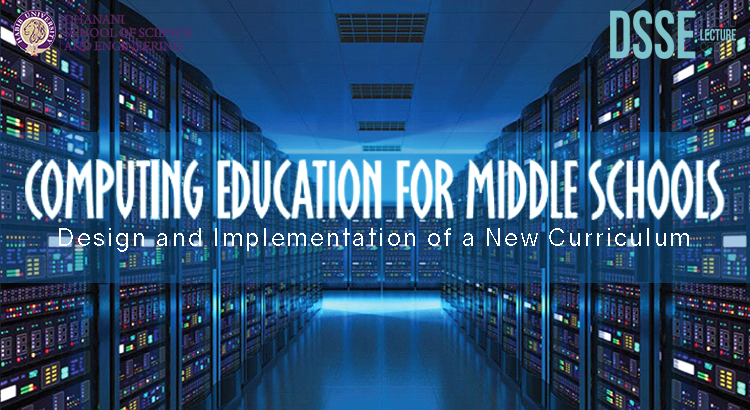
Mr. Saquib Razak, Associate Teaching Professor of Computer Science at Carnegie Mellon University in Qatar.
October 17th, 2019
Saquib Razak introduced himself as an Embedded Software Engineer and Associate Teaching Professor at Carnegie Mellon University, Qatar. Mr. Razak did his Masters from University of Texas and then received his Ph.D. in Computer Science at the State University of New York. He came to Pakistan to present an ambitious project on a revolutionised approach to teaching computer science at middle school level. The lecture he delivered at Habib University was accordingly about understanding the importance of incorporating computation education in middle school curricula and how to effectively accomplish this. The session was duly attended by middle school teachers and other academic personnel, in addition to students and faculty members of Habib.
Mr. Razak started off with an anecdotal recitation of his experience with the reformed computer studies curriculum and its application to the education systems in Qatar. He recounted his surprise at discovering the lack of seriousness with which computer studies was dealt with in the private school his son attended. As he decided to teach at the school himself, Mr. Razak realised the need for a reformative approach to the curriculum. This is where Alice comes in, a programming tool that is specifically designed to teach children computational thinking and the basics of coding in a fun way. Its production was led by Randy Pausch, a computer science engineer and professor, who is known for the contributions to the field he made during his lifetime. Pausch was of the view that the best way to teach children is through what they enjoy and love to do. Having worked at Walt Disney Imagineering, he was familiar with the appeal of story-telling to children, so he developed a means to teach programming skills through an engaging world-building 3-D model environment.
The Alice software allows children to manipulate building blocks to create their own world and inhabit it with characters through simplified drag and drop functions based on the fundamentals of programming. It was meant to develop problem solving and logical thinking abilities in students, as they are applied in computational science. Mr. Razak emphasised that the real aim of instructing students in computer science was not to make computer scientists out of middle school goers or teach them hard coding. Coding languages will evolve and new forms of technology will emerge, the youth of tomorrow must be trained in the essential skill of critical thinking, so they are equipped to handle new challenges that will arise in a rapidly changing world. He predicted that in the near future learning programming may become as essential as mathematics.
Believing in the importance of reforming computer science studies, Mr. Razak and his team emabarked on a mission to incorporate Alice in the Qatari education system. He described the needful steps required to adapt the English version of Alice into Arabic, suited for Middle Eastern users. The significance of making the programme culturally relevant and easily understandable for students was crucial. A long procedure of developing a different set of visual interfaces, examples and computing vocabulary in Arabic was undertaken before the new version was released for testing in a few schools. Specialised teacher training, assistive materials and tools like textbooks were also introduced in time as feedback from the pilot run was worked upon. The fruitful results of their efforts were reflected in the statitstics Mr. Razak pulled up, showed that around 50% of graduating high school students in the past year in Qatar successfully completed their computer science curriculum. He clarified that they were constantly working towards further expansion. They were also in the process of developing an upgraded curriculum, in which students will transition from Alice to the more intermediate level of Python coding.
The session was concluded with Mr. Razak presenting the possibility of applying the reformed approach to computer science and bringing Alice to schools in Pakistan. He posed a technical question to the audience regarding what the medium of instruction a prospective version of Alice for Pakistan should be as a thought provoking conclusion. Overall the session was an interactive one, where Mr. Razak constantly engaged the audience, with many showing active interest in his proposal for change.

